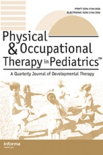
PHYSICAL & OCCUPATIONAL THERAPY IN PEDIATRICS
Scope & Guideline
Exploring the forefront of physical and occupational therapy for children.
Introduction
Aims and Scopes
- Pediatric Rehabilitation and Therapies:
Research addressing various rehabilitation techniques and interventions tailored for children with diverse needs, including physical disabilities, developmental disorders, and neurological impairments. - Assessment and Measurement Tools:
Development and evaluation of assessment tools and measurement scales to effectively assess the physical and occupational therapy needs of children, ensuring reliable and valid outcomes. - Family and Caregiver Involvement:
Emphasis on the role of family and caregivers in supporting children's therapy, including studies on parent-mediated interventions and the impact of caregiver education on therapy outcomes. - Interdisciplinary Collaboration:
Exploration of collaborative practices among healthcare professionals, including occupational therapists, physical therapists, and educators, to enhance service delivery and outcomes for children. - Innovative Technologies in Therapy:
Investigation into the use of technology, such as telehealth, virtual reality, and robotics, in pediatric therapy settings to improve access and engagement in rehabilitation.
Trending and Emerging
- Telehealth and Remote Interventions:
There is a notable increase in research focused on telehealth applications and remote therapy interventions, especially following the COVID-19 pandemic, highlighting the need for accessible therapy options. - Neurodiversity and Inclusive Practices:
An emerging emphasis on neurodiversity and the development of inclusive practices in therapy settings is evident, promoting recognition and support for children with diverse neurological profiles. - Parent-Mediated and Family-Centered Interventions:
A trend towards interventions that actively involve parents and families in the therapy process is gaining traction, with research exploring the effectiveness of such approaches. - Use of Technology and Gamification in Therapy:
The integration of technology, including gamification and virtual reality, into therapeutic practices is becoming increasingly popular, reflecting a shift towards engaging and interactive therapy methods. - Mental Health and Well-Being in Therapy:
There is a growing focus on the mental health and emotional well-being of children undergoing therapy, recognizing the importance of psychological factors in the rehabilitation process.
Declining or Waning
- Traditional Rehabilitation Techniques:
There seems to be a gradual decrease in research focused solely on traditional rehabilitation methods, as the field increasingly emphasizes innovative and evidence-based practices. - Generalized Pediatric Therapy Practices:
Research that lacks specificity to particular conditions or populations is less frequently published, indicating a trend towards more targeted and condition-specific studies. - Focus on Adult Rehabilitation Approaches:
The influence of adult rehabilitation techniques on pediatric practices appears to be waning, as the field seeks to establish distinct methodologies tailored to the unique needs of children.
Similar Journals
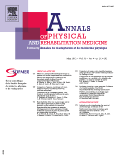
Annals of Physical and Rehabilitation Medicine
Shaping the Future of Rehabilitation with Impactful ResearchAnnals of Physical and Rehabilitation Medicine, published by Elsevier France-Editions Scientifiques Medicales Elsevier, stands as a leading peer-reviewed journal in the fields of Orthopedics and Rehabilitation. With its ISSN 1877-0657 and E-ISSN 1877-0665, this esteemed journal is known for its high-quality research articles that significantly influence clinical practices and advancements in rehabilitation medicine. Recognized for its impact, the journal is categorized in the Q1 quartiles for both Orthopedics and Sports Medicine as well as Rehabilitation disciplines. According to the Scopus rankings, it ranks #5 out of 161 in Rehabilitation and #20 out of 321 in Orthopedics and Sports Medicine, illustrating its critical role in shaping the future of these fields with a remarkable 97th and 93rd percentile standing respectively. With a commitment to excellence, the journal publishes innovative research that addresses the evolving needs of both practitioners and patients, making it an essential resource for researchers, professionals, and students dedicated to improving rehabilitation practices. The journal operates under conventional access options, ensuring that its groundbreaking findings remain accessible to a wide audience.
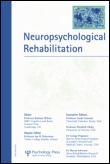
NEUROPSYCHOLOGICAL REHABILITATION
Exploring New Frontiers in Neuropsychological RecoveryNEUROPSYCHOLOGICAL REHABILITATION is a prestigious peer-reviewed journal dedicated to the field of neuropsychology and rehabilitation. Published by Routledge Journals, Taylor & Francis Ltd, it stands at the forefront of research and development in applied psychology, arts and humanities, and rehabilitation, boasting an impressive impact factor and a distinguished ranking within various academic categories. With a strong commitment to advancing the science of rehabilitation and cognitive recovery, the journal aims to provide a platform for innovative research, systematic reviews, and clinical findings that inform best practices in the field. As it converges into its third decade of publication—from 1991 to 2024—NEUROPSYCHOLOGICAL REHABILITATION remains essential for researchers, clinicians, and students seeking cutting-edge insights and methodologies to enhance patient care and cognitive rehabilitation strategies.
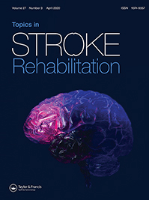
Topics in Stroke Rehabilitation
Fostering collaboration in stroke recovery strategies.Topics in Stroke Rehabilitation, published by Taylor & Francis Ltd, stands as a premier academic journal offering cutting-edge research and insights in the fields of rehabilitation, neurology, and community care. With an impressive impact factor reflecting its strong scholarly influence, this journal not only maintains a distinguished Q1 ranking in Community and Home Care and Rehabilitation but is also recognized in the Q2 category for Clinical Neurology, showcasing its relevance across multiple disciplines. Covering a comprehensive range of topics from neurorehabilitation techniques to patient-centered care strategies, Topics in Stroke Rehabilitation serves as an essential resource for researchers, healthcare professionals, and students dedicated to enhancing the quality of life for individuals recovering from stroke. With an accessible archive dating back to 1996 and continuous publication through 2024, this journal invites collaboration and discourse, fostering advancements in both theoretical knowledge and practical applications within the realm of stroke rehabilitation.
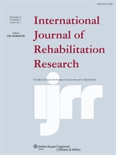
INTERNATIONAL JOURNAL OF REHABILITATION RESEARCH
Pioneering insights in rehabilitation and physical therapy since 1978.INTERNATIONAL JOURNAL OF REHABILITATION RESEARCH, published by Lippincott Williams & Wilkins, stands as a vital resource within the fields of rehabilitation and physical therapy. With an ISSN of 0342-5282 and an E-ISSN of 1473-5660, this peer-reviewed journal has been disseminating groundbreaking research since its inception in 1978. As of 2023, it holds commendable rankings with a Q3 in Medicine (miscellaneous) and Q2 in both Physical Therapy, Sports Therapy, and Rehabilitation, as well as Rehabilitation, highlighting its significant contribution to these disciplines. The journal seeks to advance knowledge and practice in rehabilitation by serving as a platform for high-quality research, clinical studies, and theoretical discussions. It is particularly valuable for researchers, healthcare professionals, and students aiming to stay at the forefront of rehabilitation science and practice. Although not designated as open access, the journal remains accessible through various academic databases, ensuring that its content reaches a broad audience committed to improving rehabilitation therapies and outcomes.
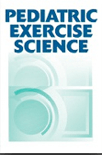
PEDIATRIC EXERCISE SCIENCE
Empowering the next generation of athletes and researchers.Pediatric Exercise Science is a premier journal focused on the intersection of exercise science and pediatric health, dedicated to advancing knowledge in the fields of orthopedics, sports medicine, and physical therapy. Published by Human Kinetics, this journal features a rich repository of original research, reviews, and clinical insights, serving as a critical resource for researchers, clinicians, and educators who aim to enhance the well-being and athletic performance of children and adolescents. With an impact factor reflective of its Q2 rankings in multiple categories—including Orthopedics and Sports Medicine, Pediatrics, and Physical Therapy—the journal holds its position as a key player in the academic community. Since its inception in 1996, Pediatric Exercise Science has progressively reflected the evolving landscape of pediatric health and performance, thus providing an essential platform for discourse and innovation. The journal is accessible through traditional subscription models, ensuring a wide distribution of critical findings and insights aimed at promoting effective practices in pediatric exercise and rehabilitation.

Current Physical Medicine and Rehabilitation Reports
Transforming Rehabilitation with Insightful DiscoveriesCurrent Physical Medicine and Rehabilitation Reports, published by SpringerNature, is an esteemed academic journal dedicated to advancing the fields of physical medicine and rehabilitation. With a focus on disseminating high-quality research and evidence-based practices, this journal covers a broad spectrum of topics including orthopedic medicine, sports therapy, and comprehensive rehabilitation strategies. While it currently holds a Q3 quartile ranking across several related categories, including medicine and rehabilitation, the journal aims to elevate its impact through open access to its content, fostering a global discussion amongst researchers, professionals, and students alike. Navigating the intersections of innovation and clinical application, Current Physical Medicine and Rehabilitation Reports serves as a vital resource for those seeking to enhance their understanding and practice in this dynamic field. With its evolving scope, the journal is committed to publishing studies and reviews that shape the future of rehabilitation and physical medicine practices.
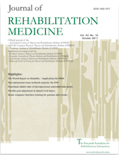
JOURNAL OF REHABILITATION MEDICINE
Exploring New Frontiers in Rehabilitation TherapyJOURNAL OF REHABILITATION MEDICINE, published by the FOUNDATION REHABILITATION INFORMATION in Sweden, stands as a leading platform for the dissemination of groundbreaking research in the field of rehabilitation. With an impact factor that places it in the Q1 category for Physical Therapy and Rehabilitation and a noteworthy Q2 ranking in Sports Science and Medicine (miscellaneous), this journal serves as an essential resource for researchers, clinicians, and students dedicated to improving patient care and rehabilitation outcomes. As an Open Access publication since 2001, it ensures that knowledge is widely accessible, promoting collaborative efforts across the global rehabilitation community. Aiming to bridge the gap between research and clinical practice, the journal covers a comprehensive range of topics, providing a vital forum for innovative studies that advance the understanding and effectiveness of rehabilitation therapies. As it approaches its convergence into 2024, the JOURNAL OF REHABILITATION MEDICINE continues to be a cornerstone for all those committed to advancing rehabilitation sciences.

Annals of Rehabilitation Medicine-ARM
Elevating Patient Outcomes Through Scholarly ExcellenceAnnals of Rehabilitation Medicine (ARM), published by the Korean Academy of Rehabilitation Medicine, is a distinguished open-access journal dedicated to advancing the field of rehabilitation medicine since its inception in 1977. With its E-ISSN 2234-0653, ARM aims to disseminate high-quality, peer-reviewed research that reflects both the breadth and depth of rehabilitation practices. As of 2023, the journal ranks in the Q2 quartile within the Rehabilitation category, placing it among the top half of journals in this domain, and it holds a respectable position in the Scopus rankings, being 70th out of 161 in the discipline. This journal emphasizes the importance of innovative research and clinical practices that improve patient outcomes in rehabilitation settings. Researchers, clinicians, and students alike will find valuable insights and the latest developments in rehabilitation science, enhancing their understanding and practice through its accessible content.
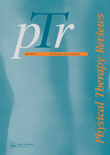
Physical Therapy Reviews
Unveiling the latest in physical therapy advancements.Physical Therapy Reviews is a distinguished journal published by Taylor & Francis Ltd that serves as a vital resource for researchers, clinicians, and students within the fields of physical therapy, rehabilitation, and sports medicine. With an ISSN of 1083-3196 and an E-ISSN of 1743-288X, this journal has earned its place in the academic community, categorized in the 2023 Q3 quartiles for Orthopedics and Sports Medicine, Physical Therapy, Sports Therapy and Rehabilitation, and Rehabilitation. Although it is not an open-access journal, the research published within its pages contributes significantly to the understanding and advancement of therapeutic practices and interventions. Covering a spectrum of topics from evidence-based clinical practices to rehabilitation techniques, Physical Therapy Reviews aims to enhance knowledge and foster innovation, making it an essential tool for anyone engaged in the health professions and rehabilitation sectors. The journal's continued commitment to high-quality scholarship ensures that it remains a relevant and impactful publication through its converged years from 1996 to 2024.

European Journal of Physical and Rehabilitation Medicine
Elevating Standards: Where Research Meets Rehabilitation PracticeWelcome to the European Journal of Physical and Rehabilitation Medicine, the premier peer-reviewed journal focusing on advancements in the fields of physical therapy, sports therapy, and rehabilitation. Published by EDIZIONI MINERVA MEDICA, this journal has established itself as a leading resource since its inception in 2008, now enjoying an impressive Q1 ranking in these disciplines according to 2023 metrics. With an emphasis on rigorous research and innovative clinical practice, the journal facilitates the dissemination of high-quality, evidence-based studies, contributing to the enhancement of patient care and therapeutic strategies. As an Open Access platform since 2022, the journal widens its reach, enabling researchers, clinicians, and students across the globe to access valuable insights without barriers. Residing in Italy, the journal's focus transcends regional confines, engaging a vibrant international community aimed at improving rehabilitation outcomes. Join us in exploring the latest developments that shape the future of rehabilitation sciences.